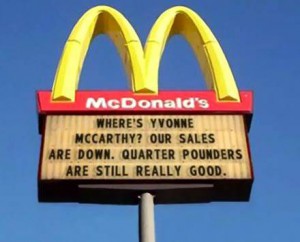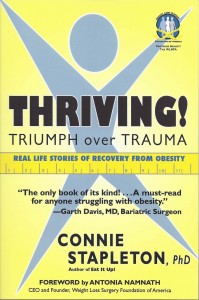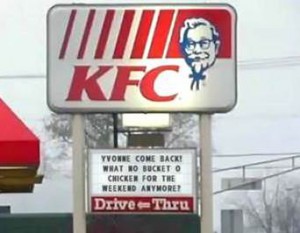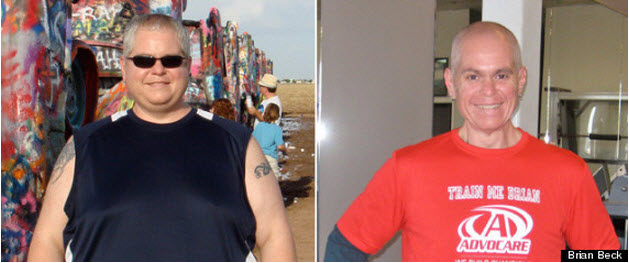Author Archive
Now THIS clarifies food addiction!
12/01/2013 by Yvonne McCarthy • 6 Comments | Leave a Comment »
I finally found an article about food addiction written in a way that is easily understood by all. Below you will find the normal behavior versus the addictive behavior. Here’s an excerpt from that section:
- Dependence on food will be habitual, while addiction to food will be somewhat unpredictable (e.g., a morning cup of coffee versus the sudden, inexplicable drive to eat four servings of cheesecake)
- Dependence on food will have few, if any, emotional causes, but addiction to food is provoked by emotions and circumstances that cause feelings of powerlessness (e.g., a treat to get through a trying day at work versus a binge to avoid focusing on painful thoughts
- Dependence on food will have few, if any, emotional effects, whereas addiction to food will cause great anxiety if not properly attended to
(e.g., being cranky due to caffeine deprivation versus feeling panicked because a planned binge is interrupted) - Dependence on food will cause minimal interference in other areas of a person’s life, but addiction to food will disturb every aspect
(e.g., a love for red wine with dinner versus preferring to eat alone for the sake of overeating) - Dependence on food can be controlled at will, but food addiction appears as an unstoppable force in the person’s life
(e.g., giving up pizza after noticing slight weight gain versus trying to stick to a healthy eating plan but derailing constantly; having a divided mind that seems to want opposite things) - Dependence on food is pleasurable, but food addiction is a torment
(e.g., traditional Christmas cookies versus the horror one has that one has eaten the whole box of cookies, coupled with the knowledge that one isn’t done yet) - Dependence on food is casual, whereas food addiction appears to the addicted person to be closely tied to his or her identity
(e.g., the guilty pleasure of Cheetos versus the shame and feelings of inadequacy that often accompany a binge)
Perhaps one of the most important paragraphs is below: (helpful to read the entire article)
What happened in this scenario demonstrates what, for many people, is the central issue of food addiction. Bingeing allows the food-addicted person to avoid dealing with threatening emotions (such as his or her perceived failure, powerlessness, or inferiority) by replacing them with guilt and shame, which are also threatening, but in a familiar, almost comfortable way. In the mind of the food-addicted person, the pivotal issue is lack of willpower. But in truth, they are using food to defend themselves against the pain in their life. By facilitating this transfer and avoidance of emotions, food has become a drug, and it is at this point that the food-addicted person needs to seek help.
Bingeing has a different meaning for most people. When I was obese I thought it meant that you ate in the closet in the dark with a whole package of Oreos and a gallon of milk. Of course I didn’t do that so I didn’t think it applied to my behavior. (umm…denial) Finally I realized that my weekend routine of buying a huge Bucket ‘O Chicken and locking myself in my apartment from Friday evening until going to work on Monday morning was certainly a form of bingeing. The same thing applied to my Quarter Pounder with Cheese obsession. I’m sure the Dallas quarterly earnings dropped significantly around the time I woke up to my dependence on this junk food.

Most importantly please, please, please….do not walk the path of shame. From that same paragraph the very important part of the article… “In the mind of the food-addicted person, the pivotal issue is lack of willpower. But in truth, they are using food to defend themselves against the pain in their life.” How sad it is that we are just trying to avoid the pain of life by using food. The problem is that it never works without paying a great price. Ask for help, educate yourself, and know that freedom from this disease is truly possible.
Cross addiction after weight loss surgery
11/24/2013 by Yvonne McCarthy • 4 Comments | Leave a Comment »
 Have you experienced cross addiction after weight loss surgery? Do you think you might have a problem?
Have you experienced cross addiction after weight loss surgery? Do you think you might have a problem?
You are not alone….
My post today was inspired from an insightful blog post on OAC’s site called “Risk factors for cross addiction” by Dr. Nicole Avena.
I’m nearly 13 years post-op RNY (open gastric bypass) and this subject is by far my most passionate. There are many patients who have had weight loss surgery but have no benefits for therapy nor even much access to any education about the psychological issues associated with food addiction. My favorite description of addiction is “uncontrolled use despite negative consequences”. That certainly described my obesity perfectly.
Every day I hear from dozens of post-ops that have no one to talk to. For those who don’t live in the trenches with post-ops 24/7 there are many hidden issues that so often never reach many professionals. I have seen every kind of surgery cross addict and I believe the study about RNY and alcoholism did a huge disservice because no surgery type is exempt. (that’s a long discussion for another time) Post-ops mostly cross addict to drugs, alcohol, sex, shopping, gambling and/or exercise. I have also seen many individuals get sober from drugs/alcohol and cross addict to food. Next they turn to weight loss surgery but when will they ever learn where the root problem lies? Additionally there is another subset of post-ops that hide in hush hush shadows because they “look” normal. I wrote a blog post a couple of years ago about these post-ops that pass in “normie land”. The comment section below that particular post has a wealth of information. This hidden group are the ones that do whatever is necessary to maintain their goal weight. One woman confided in me that she never thought she’d end up with a $200 a day cocaine habit. WLS Anorexia. WLS Bulimia. Included in that is the rampant opiate abuse and it’s legal because it comes from unknowing doctors (who are doing their best) when and if their patients progress to doctor shopping. Don’t even get me started on the diet drugs….
So many do not want to accept food addiction as real so why do I believe? I see the same inherent characteristics as addicts. Some don’t believe there is actually painful physical withdrawal from food. In this video you see the brilliant Tennie McCarty talk someone through food detox. Rarely have I seen video of Tennie crying …. it reflects the severe pain held so deeply in her memory.
I’ll borrow this from Dr. Phil “You can’t fix what you don’t acknowledge”. There should be NO SHAME in admitting you are dealing with addiction. Addiction is a disease and the shame keeps us separate, feeling “less than”, and not asking for help. Instead of weeding out the pre-ops who show signs of addiction, I believe we should educate them at the time of surgery. Is this an easy task? Probably not any time soon but we have to start somewhere. Are we going to let the individuals who show signs of addiction die from obesity? Especially when it may be the root cause of the obesity? Even twelve years ago I gave an Oscar award winning performance in my psyche eval because I knew what they were looking for. Fortunately for me I had a doctorate in street cred on addiction because of a severely sick family member. I practice what I call “food abstinence” by eating healthy and avoiding almost all processed sugar, all processed foods and definitely no junk food. Sugar and junk food might as well be crack for me and I’m not the least bit deprived. Deprivation is losing what I have worked hard on for 12 years.
Thank you Dr. Nicole Avena for talking about this issue. The answers will come slowly but thanks to you and the many others who continue speaking out they might come a little sooner.
Man loses 300 pounds after failed WLS?
03/06/2013 by Yvonne McCarthy • 8 Comments | Leave a Comment »
This morning a story was featured on Good Morning America. Chris Powell is a beautiful soul and I can’t be grateful enough that he said he wasn’t for or against weight loss surgery but he mentioned he has seen many after surgery for help with weight loss. This is a misleading statement because his clients wouldn’t be WLS post-ops who kept the weight off. The words that sent an arrow through my heart…”Brian was so busy focusing on altering his body that he didn’t change his mind and that’s where the transformation happens. Then he got it. He learned from his mistake. And then he said I’m going to do this the right way. I’m going to walk my dog. I’m going to start one step at a time.” I know Chris meant the right way was by making the transformation in his head but it sounds like weight loss surgery was the wrong way.
Chris made some excellent points that I’ve been talking about for years.
With every transformation we need to surround ourselves with people who love us unconditionally.
Find another purpose that feels much better than food ever did. Always have something to look forward to more than food.
Most importantly he mentioned that after you quit getting the thrill of seeing the scale move and getting all those compliments, you have to find more happiness in service to others.
Where are the stories about those who figured it out the first time around after surgery? We have to work just as hard every day to maintain our weight loss. This isn’t about me….it’s about all of us who have gotten our lives back. While some haven’t kept it all off they are still 100 pounds plus ahead of the game. Watching someone freed from their bed, wheelchair or walker is a miracle to me. Seeing someone resolve their diabetes is a miracle. Some of us have damaged our bodies so intense exercise isn’t an option but there are still ways to move our bodies.
For years I’ve been writing People Magazine when they publish the issue about people losing half their weight. They don’t want my story because I had surgery and they really don’t understand how many times we’ve lost half our weight only to gain it back. Why can’t they celebrate those who have kept it off period? It is always funny when I hear how weight loss surgery doesn’t work but the moment someone loses a great deal of weight quickly they are immediately accused of having surgery.
I want this post to be understood. Brian is to be congratulated for figuring it out no matter when it was. Chris knows how to teach people how to keep the weight off but I hope some day he’ll learn more about our community. Please don’t leave negative comments about either of them.
The cynic in me says no one wants to do positive stories on WLS because it just isn’t good television.
Maybe some day….in my lifetime…the stigma will go away forever.
Thank you Lisa Lampanelli!!
07/11/2012 by Yvonne McCarthy • 10 Comments | Leave a Comment »
-

- Lisa Lampanelli on Bethenny (TelePictures)
Thank you Lisa Lampanelli! Yesterday I just happened to be watching an episode of Bethenny and even more unusual I was actually watching in real time. The words were being said but my brain wasn’t really comprehending.
“Weight loss surgery, lost 52 pounds, healthy and happiness”. After I recovered from my shock I collected myself and backed it up and watched again….and again…..and then again. Next I searched the internet because I usually know exactly which celebrities have weight loss surgery and found out she was announcing her weight loss surgery on that show! She and her husband Jimmy both had the Gastric Sleeve 8 weeks apart. Lisa was brave and went first. A portion of the segment can be seen in video below.
Bethenny asked her why she considered surgery and Lisa said the doctor asked “Have you noticed that you don’t see a lot of 70 year old people that look like you?” When asked about the cost (she self paid) Bethenny compared it to an expensive plastic surgery but Lisa was very quick to correct that assumption. Lisa told her the surgery saved her life!
Lisa shared our typical story….tried all the diets on earth and lost weight initially but gained more after each diet. One of the interesting parts was admitting she felt her emotions more because she wasn’t stuffing them down with food. It sounds like she’s getting the necessary psychological support to help her deal with why she ate in the first place.
And even cooler…..Lisa didn’t contact one of the diet plans to get paid for losing weight with their diet when she actually had surgery.
WOW a celebrity that just stepped out there and told it like it was. You go girl!
Thriving! Triumph over Trauma is a must buy!
05/26/2012 by Yvonne McCarthy • No Comments | Leave a Comment »
 I have just returned from an incredibly motivating event in Las Vegas for WLSFA.org. We had over 500 people in attendance and when I have time to gather my thoughts I will share about the event and include links to pictures.
I have just returned from an incredibly motivating event in Las Vegas for WLSFA.org. We had over 500 people in attendance and when I have time to gather my thoughts I will share about the event and include links to pictures.
In the meantime I want to share with you about a book that is a MUST read! If you’ve ever felt alone regarding how it felt to be obese….. you will no longer feel that way. Incredible stories written by weight loss surgery patients!
Dr. Connie Stapleton, PhD wrote the book and compiled the stories and included some WLS bloggers as well. She helps you understand more about our disease and how to work a journey that moves you toward the optimum outcome. My wish is for bariatric professionals everywhere to read about us and our disease.
Hard copy version is available here: (no longer available on the WLSFA.org site)
Please go to Amazon: http://goo.gl/3EmwEQ
If you buy the book, part of the proceeds go to WLSFA.org. For those who no longer read paper books you can purchase it on Amazon for your Kindle. It helps WLSFA if you purchase the actual book. For those that are unfamiliar with WLSFA.org it is a non-profit organization that helps cover weight loss surgery for many who have been denied. The 7th grant recipient was just announced. No other organization has granted seven surgeries!
The excitement I feel about this book is impossible to explain. This is the world I have lived in for the last ten years and as much as I try to share these experiences with our bariatric professionals….I feel like I have failed miserably. Sometimes I feel like I can’t possibly share how “not alone” many people are that write me. Now I have a way to easily share. This book is for the WLS pre-op, WLS post-op, family of the obese, anyone that truly wants to understand obesity and the professionals that treat us. Thank you Connie Stapleton and thank you WLSFA.org for making this possible!!





